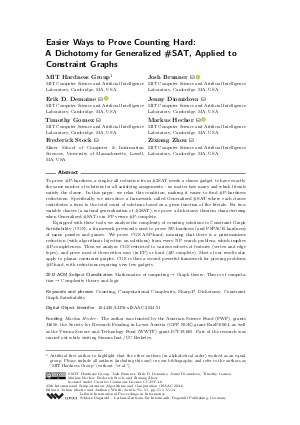Easier Ways to Prove Counting Hard: A Dichotomy for Generalized #SAT, Applied to Constraint Graphs
Authors
MIT Hardness Group,
Josh Brunner  ,
Erik D. Demaine
,
Erik D. Demaine  ,
Jenny Diomidova,
Timothy Gomez,
Markus Hecher
,
Jenny Diomidova,
Timothy Gomez,
Markus Hecher  ,
Frederick Stock,
Zixiang Zhou
,
Frederick Stock,
Zixiang Zhou
-
Part of:
Volume:
35th International Symposium on Algorithms and Computation (ISAAC 2024)
Part of: Series: Leibniz International Proceedings in Informatics (LIPIcs)
Part of: Conference: International Symposium on Algorithms and Computation (ISAAC) - License:
 Creative Commons Attribution 4.0 International license
Creative Commons Attribution 4.0 International license
- Publication Date: 2024-12-04
File

PDF
LIPIcs.ISAAC.2024.51.pdf
- Filesize: 0.85 MB
- 14 pages
Document Identifiers
Subject Classification
ACM Subject Classification
- Mathematics of computing → Graph theory
- Theory of computation → Complexity theory and logic
Keywords
- Counting
- Computational Complexity
- Sharp-P
- Dichotomy
- Constraint Graph Satisfiability
Metrics
- Access Statistics
-
Total Accesses (updated on a weekly basis)
0PDF Downloads0Metadata Views
Abstract
To prove #P-hardness, a single-call reduction from #2SAT needs a clause gadget to have exactly the same number of solutions for all satisfying assignments - no matter how many and which literals satisfy the clause. In this paper, we relax this condition, making it easier to find #P-hardness reductions. Specifically, we introduce a framework called Generalized #SAT where each clause contributes a term to the total count of solutions based on a given function of the literals. For two-variable clauses (a natural generalization of #2SAT), we prove a dichotomy theorem characterizing when Generalized #SAT is in FP versus #P-complete. Equipped with these tools, we analyze the complexity of counting solutions to Constraint Graph Satisfiability (CGS), a framework previously used to prove NP-hardness (and PSPACE-hardness) of many puzzles and games. We prove CGS ASP-hard, meaning that there is a parsimonious reduction (with algorithmic bijection on solutions) from every NP search problem, which implies #P-completeness. Then we analyze CGS restricted to various subsets of features (vertex and edge types), and prove most of them either easy (in FP) or hard (#P-complete). Most of our results also apply to planar constraint graphs. CGS is thus a second powerful framework for proving problems #P-hard, with reductions requiring very few gadgets.
Cite As Get BibTex
MIT Hardness Group, Josh Brunner, Erik D. Demaine, Jenny Diomidova, Timothy Gomez, Markus Hecher, Frederick Stock, and Zixiang Zhou. Easier Ways to Prove Counting Hard: A Dichotomy for Generalized #SAT, Applied to Constraint Graphs. In 35th International Symposium on Algorithms and Computation (ISAAC 2024). Leibniz International Proceedings in Informatics (LIPIcs), Volume 322, pp. 51:1-51:14, Schloss Dagstuhl – Leibniz-Zentrum für Informatik (2024)
https://doi.org/10.4230/LIPIcs.ISAAC.2024.51
BibTex
@InProceedings{mithardnessgroup_et_al:LIPIcs.ISAAC.2024.51,
author = {MIT Hardness Group and Brunner, Josh and Demaine, Erik D. and Diomidova, Jenny and Gomez, Timothy and Hecher, Markus and Stock, Frederick and Zhou, Zixiang},
title = {{Easier Ways to Prove Counting Hard: A Dichotomy for Generalized #SAT, Applied to Constraint Graphs}},
booktitle = {35th International Symposium on Algorithms and Computation (ISAAC 2024)},
pages = {51:1--51:14},
series = {Leibniz International Proceedings in Informatics (LIPIcs)},
ISBN = {978-3-95977-354-6},
ISSN = {1868-8969},
year = {2024},
volume = {322},
editor = {Mestre, Juli\'{a}n and Wirth, Anthony},
publisher = {Schloss Dagstuhl -- Leibniz-Zentrum f{\"u}r Informatik},
address = {Dagstuhl, Germany},
URL = {https://drops.dagstuhl.de/entities/document/10.4230/LIPIcs.ISAAC.2024.51},
URN = {urn:nbn:de:0030-drops-221790},
doi = {10.4230/LIPIcs.ISAAC.2024.51},
annote = {Keywords: Counting, Computational Complexity, Sharp-P, Dichotomy, Constraint Graph Satisfiability}
}
Author Details
- Miner School of Computer & Information Sciences, University of Massachusetts, Lowell, MA, USA
Funding
- Hecher, Markus: The author was funded by the Austrian Science Fund (FWF), grants J4656, the Society for Research Funding in Lower Austria (GFF NOE) grant ExzF-0004, as well as the Vienna Science and Technology Fund (WWTF) grant ICT19-065. Part of the research was carried out while visiting Simons Inst./UC Berkeley.
References
- Jin-Yi Cai, Pinyan Lu, and Mingji Xia. Holographic reduction, interpolation and hardness. Computational Complexity, 21:573-604, 2012. URL: https://doi.org/10.1007/S00037-012-0044-6.
- Paul Dagum and Michael Luby. Approximating the permanent of graphs with large factors. Theoretical Computer Science, 102(2):283-305, 1992. URL: https://doi.org/10.1016/0304-3975(92)90234-7.
-
Robert A. Hearn and Erik D. Demaine. Games, Puzzles, and Computation. CRC Press, 2009.

- Takashi Horiyama, Takehiro Ito, Keita Nakatsuka, Akira Suzuki, and Ryuhei Uehara. Complexity of tiling a polygon with trominoes or bars. Discrete & Computational Geometry, 58(3):686-704, October 2017. URL: https://doi.org/10.1007/s00454-017-9884-9.
- M. R. Krom. The decision problem for a class of first-order formulas in which all disjunctions are binary. Mathematical Logic Quarterly, 13(1-2):15-20, 1967. URL: https://doi.org/10.1002/malq.19670130104.
- David Lichtenstein. Planar formulae and their uses. SIAM Journal on Computing, 11(2):329-343, 1982. URL: https://doi.org/10.1137/0211025.
- MIT Hardness Group, Josh Brunner, Lily Chung, Erik D. Demaine, Della Hendrickson, and Andy Tockman. ASP-completeness of Hamiltonicity in grid graphs, with applications to loop puzzles. In Proceedings of the 12th International Conference on Fun with Algorithms, pages 30:1-30:20, 2024. URL: https://doi.org/10.4230/LIPICS.FUN.2024.23.
- J. Scott Provan and Michael O. Ball. The complexity of counting cuts and of computing the probability that a graph is connected. SIAM Journal on Computing, 12(4):777-788, 1983. URL: https://doi.org/10.1137/0212053.
- Takahiro Seta. The complexities of puzzles, Cross Sum, and their Another Solution Problems (ASP). Senior thesis, University of Tokyo, 2002. URL: https://web.archive.org/web/20221007013910/www-imai.is.s.u-tokyo.ac.jp/~seta/paper/senior_thesis/seniorthesis.pdf.
- Seinosuke Toda. PP is as hard as the polynomial-time hierarchy. SIAM J. Comput., 20(5):865-877, 1991. URL: https://doi.org/10.1137/0220053.
- Salil P. Vadhan. The Complexity of Counting in Sparse, Regular, and Planar Graphs. SIAM J. Comput., 31(2):398-427, 2001. URL: https://doi.org/10.1137/S0097539797321602.
-
Leslie G. Valiant. A polynomial reduction from satisfiability to Hamiltonian circuits that preserves the number of solutions. Manuscript, 1974.

- Leslie G. Valiant. The complexity of computing the permanent. Theor. Comput. Sci., 8:189-201, 1979. URL: https://doi.org/10.1016/0304-3975(79)90044-6.
- Leslie G. Valiant. The complexity of enumeration and reliability problems. SIAM J. Comput., 8(3):410-421, 1979. URL: https://doi.org/10.1137/0208032.
- Takayuki Yato and Takahiro Seta. Complexity and completeness of finding another solution and its application to puzzles. IEICE Transactions on Fundamentals of Electronics, Communications and Computer Sciences, 86(5):1052-1060, 2003. URL: http://search.ieice.org/bin/summary.php?id=e86-a_5_1052.
